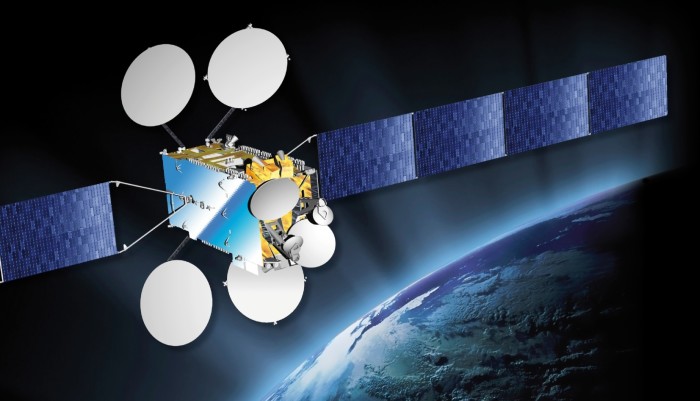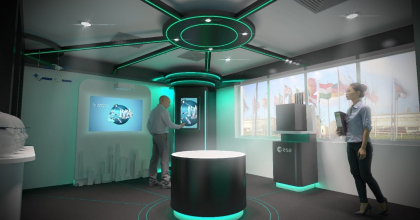
The first three products supported by the Atlas extension to the ARTES 3-4 programme are now starting to become operational, having been successfully launched aboard the EUTELSAT 8 West B satellite which has now entered service. Eutelsat confirmed the introduction into service of the spacecraft on 3 October, stating that it “has been fully powered up and is already broadcasting TV channels to over 52 million homes in the Middle East and North Africa.” The 5.8 tonne satellite was built for Eutelsat by Thales Alenia Space.
The Atlas programme was initiated in 2013 to promote the introduction of innovative products into the satcom market by supporting their first flight opportunity. The launch of these first units represents a major milestone, leading to the next phase of maturity for the Atlas programme. The value of the Atlas programme and its contribution to the Eutelsat spacecraft has been acknowledged by Eutelsat.
Hector Fenech of Eutelsat stated “The Atlas activities on Eutelsat 8WB have been a successful partnership between Eutelsat and ESA to bring these new and exciting technologies into service and Eutelsat looks forward to working again with ESA on future Atlas cases”.
The three new products introduced on Eutelsat 8WB provide additional signal security and flexibility for the operation of the satellite and for the broadcast services it provides.
A new-generation Ku Band flexible frequency converter, built by Thales Alenia Space in France, provides the ability to change the frequency of the uplink signal without any change to the downlink broadcast signal that is received by home viewers. This is a major breakthrough in the prevention of broadcast signals from being jammed by rogue signal sources.
A new high-power amplification system (Dual Flex LCTWTA), built by Thales Alenia Space Belgium, provides flexibility in the power and frequency settings of the broadcast beam. This allows the power allocated to a channel to be set according to the current need. This in turn optimises the use of the spacecraft’s available electrical power, making it possible to increase the number of active channels at a given moment.
A new frequency-flexible command receiver provided by Thales Alenia Space France, gives Eutelsat much enhanced operational flexibility, particularly with regard to repositioning the spacecraft to any other orbital slot. With this command receiver, frequency coordination with nearby satellites and jamming by rogue signal sources can be readily handled.
The performance of the units on Eutelsat 8 WB will now be monitored over the next year. Operational data will be collected and analysed to augment the ground qualification test results of these units, giving increased confidence to industry, ESA and Eutelsat and helping to drive future sales.
Immediate Payback
Even before the collection of in-orbit performance data, the inclusion of these innovative units on Eutelsat’s 8WB spacecraft has already resulted in follow-on orders.
Henri Declercq of TAS-Belgium stated “Working with ESA and Eutelsat to achieve the first flight of the dual flex LCTWTAs on E8WB, has been a great success for TAS-Belgium, and has helped us to book further sales of these units even before the spacecraft was launched”.
Thales Alenia Space France report a similar story with the Ku-Band Flexible Frequency Converter and the Command Receiver, with units already being sold on two other spacecraft and with a number of other opportunities under discussion.
With the results described above, it can be seen that it is not always necessary to have in-orbit performance data to win orders for newly introduced equipment. For innovations of particular interest, the confirmation that it will be launched by an established satellite operator can be enough to trigger further sales.
"ESA is steadily building a pipeline of other equipment supported by Atlas, with a variety of manufacturers, satellite primes, and operators", says John Shirlaw, Section Head, Flight Products Heritage and Hosted Payloads at ESA. "We look forward to being able to announce the launch and introduction into service of the next set of new products from Member States supported through the Atlas programme."




